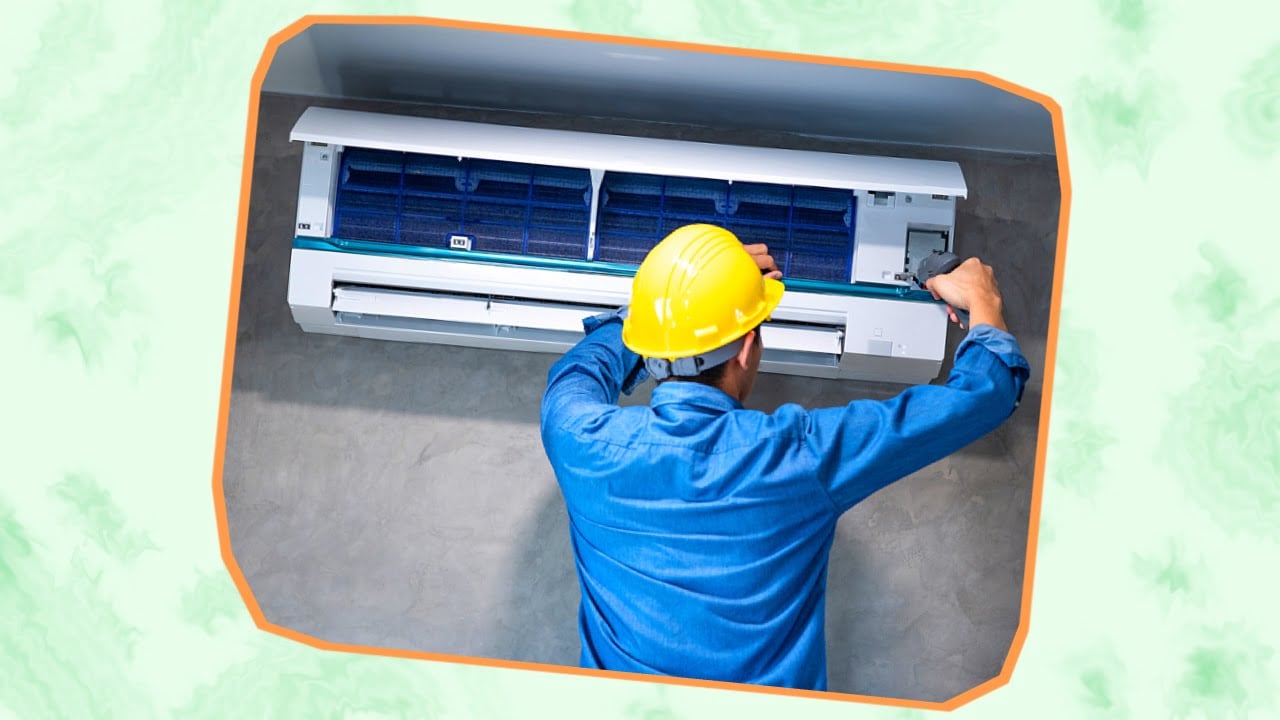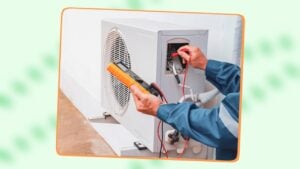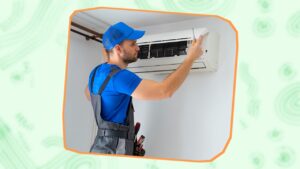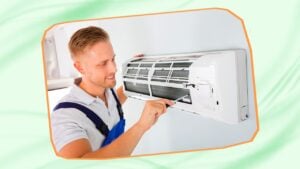Replacing an AC would be a sound decision if your unit is over 10 years old, runs on R-22 or needs frequent repairs. However, if your unit requires minor repairs, hiring an HVAC repair technician would be the best bet.

Is your age-old air conditioning unit failing to deliver optimum cooling?
Deciding between repairing and replacing air conditioners is challenging for every property owner. Sometimes, repairing a central air conditioning unit costs less than replacing it. But other times, the repair costs exceed the cost of replacement.
So, if you’re stuck at a crossroads and unable to decide between repair and replacement, this guide will help you.
Air Conditioner: To Repair Or Replace?

Contrary to popular belief, replacing your current system with a new one is more cost-effective than repairing it. Wondering how? Let me explain that to you.
Suppose the compressor of your old central air system stops working, and you spend a few dollars on replacing it with a new one. After the repair is done, your air conditioner is functioning normally. However, a few months later, the compressor malfunctions, or let’s say that the pump motor starts acting up.
If every few months, you call an HVAC technician to repair your current air conditioner, the maintenance costs will keep increasing. So, in such scenarios, replacing your old AC system with a new HVAC unit will be the best bet.
Before you head over to get a new air conditioner for your home, take a look at the major components of the system and the money required to get them repaired.
Parts Of An Air Conditioning Unit: How Long Do They Last?
Much like other electronic equipment, AC units don’t cease functioning suddenly. Over time, with regular wear and tear, each of its parts starts to weaken and eventually fail. A few components, despite the HVAC equipment being operated at normal conditions, fail faster than others.
Repairing or replacing those parts is labor-intensive, especially in older units. That said, let’s take a look at the major components of AC units and their lifespan.
1. Compressor
The compressor is one of the most important components of an air conditioner, which is responsible for releasing the heat from the refrigerant.
Nestled inside the HVAC system, the compressor consists of both mechanical and electrical parts. The average lifespan of the compressor ranges between 12 years and over 20 years. In certain scenarios, a well-maintained compressor can last for more than 40 years.
Mostly, air conditioner compressors fail for two reasons:
- Internal lock up
- Electrical short
Note that once compressors start malfunctioning, they can hardly be repaired. That means replacing them is the only option for your system to function normally.
2. Condenser Or Outdoor Coil
The condenser (heat transfer) or outdoor coil converts high-pressure gas, which it receives from the compressor to liquid.
Forming the outer wall of the AC unit, condensers are among those few components that have a low failure rate. That means they come with a longer lifespan than other components; of course, regular maintenance will determine their average lifespan.
3. Evaporator Or Indoor Coil
Located inside an air handler or the top of the furnace (central heating), the evaporator or indoor coil absorbs heat from the indoor air and directs it to the compressor.
In newer AC units, evaporator coils are either made of steel, aluminum, or copper. Unlike condensers, they don’t come with a long lifespan; refrigerant leak may occur as early as 12 years. But in the majority of the ACs, evaporator coils leak refrigerant between 15 and 20 years.
The average repair costs of both condenser and evaporator coils are pretty much the same.
4. Other Parts
Other parts, though small, play an equally important role in the functioning of the air conditioner.
In both the new unit and the old system, the contractor is in charge of turning the air conditioner on and off. 240 volts pass through the residential AC units, but, over time, the metal develops pits due to operation, and the contactor burns, inhibiting electrical passage.
Moreover, the fan motor in air conditioner units keeps the air moving. With regular usage, the fan blades bend or lock up, preventing the air conditioner from functioning normally. Usually, fan blades last for about 10 to 12 years; however, they can exceed their average lifespan with proper maintenance.
Another small yet significant part of an air conditioner is the capacitor that supplies the initial burst of electricity needed by the unit to function properly. The power comes in a single phase, but the speed isn’t consistent. Low refrigerant, dirty coils, and extreme heat are responsible for a malfunctioning capacitor.

The Average Repair Cost Of Air Conditioners
High energy consumption in air conditioners will eventually lead to an increase in energy bills. Whether it’s the capacitor or the fan blower that is malfunctioning, air conditioners call for immediate attention.
If you’re thinking of repairing your current AC unit, considering the average costs of repair is important. Here’s a quick rundown of the average repair cost of the important components of the air conditioner.
| Replacement Components | Average Cost |
|---|---|
| Condenser | $1,700 and above |
| Evaporator | $1,500 and above |
| Compressor | $2,000 and above |
| Small Components | $300 to $800 |
Remember, at times, these may appear as a simple repair but can turn out to be something major upon diagnosis.
Efficient Energy Use: How Efficient Is Your Air Conditioner?
Air conditioner efficiency is another factor that determines the cost. As previously mentioned, a malfunctioning air conditioner can shoot up your energy bills. But did you know that even older units tend to consume a lot of energy when running?
Although routine maintenance and repairs of your heating, ventilation and air conditioning (HVAC system) can be conducted by an experienced technician, an inefficient cooling or heating system can never be fixed.
In air conditioners, efficiency is measured by the seasonal energy efficiency ratio or SEER rating. Basically, it’s a computation of the amount of heat released in relation to the amount of energy utilized by an air conditioner.
Though the SEER rating starts at 8, there is no absolute limit to how high it can go. Most efficient HVAC units usually fall between the 20 and 25 SEER range.
Remember, an older system wouldn’t have a high SEER rating. But the seasonal energy efficiency ratio isn’t the sole element to gauge the performance of an air conditioner. Other factors, such as the condition of the electrical components, refrigerant amount, and professional maintenance, contribute to the output of your air conditioner.
5 Signs Of A Malfunctioning HVAC System
Irrespective of whichever AC brand you purchase, the average lifespan of every unit ranges between 15 and 20 years. However, a lot of factors come into play, like climate, the frequency with which it’s used, and maintenance.
Even the most well-maintained unit runs into some problems after a period of wear and tear. Here are some signs of a malfunctioning HVAC system, so if you notice any of these, calling for HVAC professionals would be the best bet.
1. Your AC Is Making Strange Noises
Never will a properly functioning air conditioner make noise; rather, it will run quietly.
An HVAC system becomes noisy as it starts getting old or with regular usage. Less noise indicates that a few parts in the unit have loosened, so your air conditioner will need minor repairs. For instance, when the fan doesn’t work properly, the unit makes minor sounds.
But if strange noises like grinding or squealing are produced by your HVAC system, there could be a major fault. In some cases, replacing the faulty component will help, but you will have to replace the unit if there’s severe damage.
Whether you intend to repair or replace, calling for licensed technicians from a local utility company will be the best way forward.
2. Unexplained Upsurge In Energy Bills
Yes, energy usage varies from season to season, but the total cost each month, during the off-season, should be more or less similar. A sudden upsurge in energy bills is an indication that your HVAC system isn’t functioning properly.
There could be numerous reasons behind the sudden hike in your utility bills due to your air conditioner. However, there are a couple of things that I suggest doing before calling a professional for AC repair.
First off, clean the air vents, look for lumps and knots in the condensing oil and change the filter. Failing parts and air leaks also contribute to high electricity bills. The only way to increase your energy savings or energy conservation is by replacing your old air conditioner with an energy star-certified unit.
3. Excessive Dust In The House
The function of an air conditioner isn’t limited to making a space comfy and cozy but also improves indoor air quality by countering air pollution. An efficient air conditioner will eliminate dander, dirt, debris, and dust from your space.
Excessive dust in your room means your HVAC unit isn’t as effective as it was formerly. Before you call an HVAC technician, try cleaning the air filters. But even after that, if the indoor air quality is poor, your best bet is to call a technician who can inspect the HVAC unit and identify the issue.
4. Unusual Odors From The Air Conditioner Unit
Strange or unusual odors coming from the air conditioner unit are certainly a sign that the system isn’t working efficiently.
More often than not, ACs emit odd smells because of dirty filters, mold in the duct (flow), or damaged insulation. Even after cleaning the filters and ductwork or repairing the insulation, the awful smell doesn’t go away, you will have to book an AC replacement service.
5. Corrosion Or Acid Formation In The AC Unit
Corrosion or formation of acid in air conditioners is never a positive sign. In such scenarios, you should hire an HVAC technician for AC repair right away, or you will have to incur hefty expenses.
The continued buildup of acid will reduce the lifespan of the cooling system and damage it to the extent that it will cease functioning. Corrosion or acid formation occurs due to a variety of reasons, such as:
- Air leaks via a condensate pump
- Contaminated refrigerant
- Inconsistent, poor upkeep, or incorrect repairs
- Exposure to extreme heat
Through swift intervention, acid buildup in an AC unit can be controlled, if the motor of the compressor isn’t rusted. But if the unit is corroded, replacing it is the only solution because no amount of repairs will restore it to its normal condition.

4 Questions To Ask Yourself
Whether you should repair or replace your air conditioner is a big decision for every homeowner. Not only does it affect your finances, but also your safety and comfort. For homeowners confused between the two, I have put together a few factors that you need to consider when making a decision.
1. What Is The Age Of Your Current System?
As I have already mentioned, AC units last for about 15 to 20 years, although a lot of factors come into play in determining their longevity.
If your air conditioner runs almost all year round, its life expectancy will be lower than those that are used seasonally. In addition to that, exposure to sulfur, salt water, and high humidity levels takes a toll on the efficiency of the unit.
Proper installation and regular maintenance are other factors that have a direct impact on the lifespan of the system. However, as a general rule of thumb, I’d say that you should replace your AC if it’s older than 10 years.
2. Is Your Home Air Conditioner As Efficient As The New Ones?
I’ve already discussed the SEER rating that determines the efficiency of AC units.
As per the SEER rating, a system consumes less energy if it has a high rating. And these days, AC units (ductless ones) come with ratings of 14 to 25 SEER.
So, if you upgrade your 10 or 15-year-old 11 SEER AC unit to a 17 SEER one, you’ll save a lot on cooling costs. And if you wish to save more, upgrading to a unit with an even higher SEER rating will be wise.
Remember, saving energy isn’t only beneficial for you but also for the environment– so think wisely!
3. How Much Will The Repair Cost?
Repairs like replacing a burnt capacitor or cleaning a clogged drain are minor ones. That means their replacement costs wouldn’t be so high that you should consider replacing your current unit with a new one.
But, in case you need to repair an AC that is at least 10 to 12 years old, the expected repair expense would be close to 50% of its worth. Therefore, replacing the unit makes more sense than spending money on repairs.
You should also consider how frequently your system requires maintenance. Ask yourself– has the AC been functioning normally without a hitch, or do you call technicians more often than not?
In the second scenario, upgrading to a new system like those with smart thermostats or variable speed technology is more cost-effective than spending money on repairing an old system.
4. Is Your AC Still Running On R-22 Or Freon?
Officially, R-22 has been phased out in the United States since January 1, 2020, because of its harmful effects on the ozone layer. Import and production are also prohibited, so obtaining it is extremely expensive.
Despite that, many old ACs still run on R-22 (a substance causing ozone depletion), which means you will have to use recycled refrigerant if there’s a refrigerant leak in your unit.
On the other hand, Puron or R-410A is the current standard refrigerant, an eco-friendly alternative to R-22, found in newer units. So, if you have an AC older than 8 to 10 years, your system runs on R-22 or Freon, and upgrading to a non-ozone-depleting chlorofluoromethane will be ideal.
Tip
When choosing between repairing and replacing your AC, I suggest you consider how long you intend to stay in the same house. Like, replacing your old unit won’t be a sound investment if you plan on selling your home. Also, if your AC doesn’t cool the room as it should, upgrading to a new one will be the best bet.
Deciding between repairing and replacing your air conditioning system is certainly challenging for every homeowner. Nevertheless, taking into consideration certain factors can help you decide if you should repair or replace your AC unit. They are as follows: In such cases, repairing a unit won’t work because your air conditioning system is losing its efficiency. While you can go ahead and get the unit repaired, keep in mind that the problems will relapse, and the unit will break down again in a few months. Another way to figure out if repair or replacement is the solution is to go by the 5000 rule. All you need to do is multiply the age of your AC by the repair cost. If it equals or exceeds $5000, the answer is simple: your air conditioning unit needs to be replaced. Approximately, it will cost between $2,750 and $12,095, although this depends on a variety of factors. The unit you choose and the size of your home play a crucial role in determining the replacement cost of an air conditioner. If you don’t want to spend a fortune, portable units will be the best bet because they are relatively affordable. Even split systems aren’t that expensive, but they call for professional installation. However, be prepared to shell out extra cash if you’re replacing a central air conditioning system. That’s because they are the most expensive AC units on the market, so you’ll have to spend a good amount of money on replacing them. Ideally, an air conditioning system should be serviced once a year, with regular inspection after every 3 to 4 months. Also, never try to service your air conditioner yourself because the interior of the AC consists of a lot of components which may get damaged if not handled carefully. Always hire a professional HVAC service company so that its licensed technicians will service your AC efficiently without damaging any component. However, remember that the servicing period varies from model to model. Additionally, how often you use the AC unit determines if your AC needs to be serviced once a year or once after every few months. At times, air conditioning units do turn on, but they stop blowing cold air. There isn’t one but several reasons behind this problem. Like, the air filter might be clogged with dirt, dust, pet danders and other impurities. Or, there may be power or thermostat issues, because of which your AC unit isn’t blowing cold air. Low refrigerant levels, ice buildup and dirty compressor, could also be the reason why your air conditioner is malfunctioning. Yes, it’s necessary to cover the outdoor unit in winter to prevent leaves, debris, seeds, shrubs and nuts from getting inside the system. However, make sure to remove the cover when summer arrives before turning on the unit. Otherwise, the airflow will be restricted and trapped within the unit. As a result, it will cause hefty damage to the air conditioning system. As already mentioned, air conditioning units can last up to 20 years, provided it’s maintained properly. Here are a few ways through which you can extend the lifespan of your air conditioning systems. 1. Clean the area around the outdoor unit periodically to ensure the dirt or shrubs don’t make their way inside the unit. 2. Remove the air filter and clean them with lukewarm water to remove dirt and impurities. 3. Check the vents regularly to ensure they aren’t clogged. In case they are clogged, the unit won’t work efficiently and will consume more power than usual. 4. Install a smart thermostat because thermostats cut down energy costs. AC Replacing Or Repairing FAQs

Final Thoughts
Every AC breaks down after a period of time, although the warning signs aren’t very obvious. And that’s why choosing whether to replace your HVAC system or repair it is difficult.
Though much of it depends on personal preferences, there are a few scenarios where replacing it makes more sense. Any unit that calls for frequent repairs or causes an upsurge in the utility bills should be replaced without second thoughts.
Meanwhile, you can call an HVAC repair technician in case of minor repairs like cleaning air vents or fixing the thermostat. Also, don’t forget to consider the tax credit, warranty, and manufacturing rebate when making a decision.
